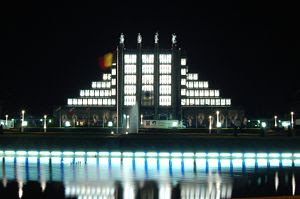
n. pl. en·tro·pies 1. Symbol S For a closed thermodynamic system, a quantitative measure of the amount of thermal energy not available to do work.
2. A measure of the disorder or randomness in a closed system.
3. A measure of the loss of information in a transmitted message.
4. The tendency for all matter and energy in the universe to evolve toward a state of inert uniformity.
5. Inevitable and steady deterioration of a system or society.
[German
Entropie : Greek
en-,
in; see
en-2 + Greek
trop
,
transformation; see
trep- in Indo-European roots.]
en·tro pic (
pic ( n-tr
n-tr
 p
p k, -tr
k, -tr p
p
 k) adj.
k) adj. en·tro pi·cal·ly adv.
pi·cal·ly adv. The American Heritage® Dictionary of the English Language, Fourth Edition copyright ©2000 by Houghton Mifflin Company. Updated in 2009. Published by Houghton Mifflin Company. All rights reserved.
entropy (ĕn`trəpē), quantity specifying the amount of disorder or randomness in a system bearing energy energy, in physics, the ability or capacity to do work or to produce change. Forms of energy include heat , light , sound , electricity , and chemical energy.
..... Click the link for more information. or information. Originally defined in thermodynamics Carnot cycle after the French physicist Sadi Carnot , who first discussed the implications of such cycles. During the Carnot cycle occurring in the operation of a heat engine, a definite quantity of heat is absorbed from a reservoir at high temperature; part of this heat is
in terms of heat and temperature, entropy indicates the degree to which a given quantity of thermal energy is available for doing useful work—the greater the entropy, the less available the energy. For example, consider a system composed of a hot body and a cold body; this system is ordered because the faster, more energetic molecules of the hot body are separated from the less energetic molecules of the cold body. If the bodies are placed in contact, heat will flow from the hot body to the cold one. This heat flow can be utilized by a heat engine (device which turns thermal energy into mechanical energy, or work), but once the two bodies have reached the same temperature, no more work can be done. Furthermore, the combined lukewarm bodies cannot unmix themselves into hot and cold parts in order to repeat the process. Although no energy has been lost by the heat transfer, the energy can no longer be used to do work. Thus the entropy of the system has increased. According to the second law of thermodynamics, during any process the change in entropy of a system and its surroundings is either zero or positive. In other words the entropy of the universe as a whole tends toward a maximum. This means that although energy cannot vanish because of the law of conservation of energy, it tends to be degraded from useful forms to useless ones. It should be noted that the second law of thermodynamics is statistical rather than exact; thus there is nothing to prevent the faster molecules from separating from the slow ones. However, such an occurrence is so improbable as to be impossible from a practical point of view. In information theory the term entropy is used to represent the sum of the predicted values of the data in a message.
The Columbia Electronic Encyclopedia® Copyright © 2007, Columbia University Press. Licensed from Columbia University Press. All rights reserved.
www.cc.columbia.edu/cu/cup/Marxism and ecological economics Ecological economics is a transdisciplinary field of academic research that addresses the dynamic and spatial interdependence between human economies and natural ecosystems. ; toward a red and green political economy.
Burkett, Paul.
Brill Brill or Bril, Flemish painters, brothers.
Mattys Brill (mä`tīs), 1550–83, went to Rome early in his career and executed frescoes for Gregory XIII in the Vatican. Academic Publishers
2006
355 pages
$89.00
Hardcover
Historical materialism historical materialism: see dialectical materialism. book series; v.11
HC79
Insights from Marxist political economy, argues Burkett (economic, Indiana State U.) can aid ecological economics "better fulfill its commitments to methodological pluralism, interdisciplinarity, and openness to new visions of policy and of structural economic change that confront the current biospheric crisis." For the purposes of his argument, he focuses on four fundamental issues: the relations between nature and economic value, the treatment of nature as capital, the significance of the entropy blaw for economic systems, and the concept of sustainable development.. In addressing the last of these, he employs the Marxist distinction between environmental crises of capital accumulation versus crises in the natural conditions of human development and discusses how Marxism already integrates the sustainable development dimensions of the common pool character of natural resources; the co-evolution of individual human beings, society, and nature; and common property management of natural resources, all concepts dealt with more or less separately by ecological economists.
([c]20062005 Book News, Inc., Portland, OR)





 i·cal·ly adv.
i·cal·ly adv. -s
-s
 m)
m)

 m
m k
k



 , transformation; see trep- in Indo-European roots.]
, transformation; see trep- in Indo-European roots.] n-tr
n-tr
 p
p






